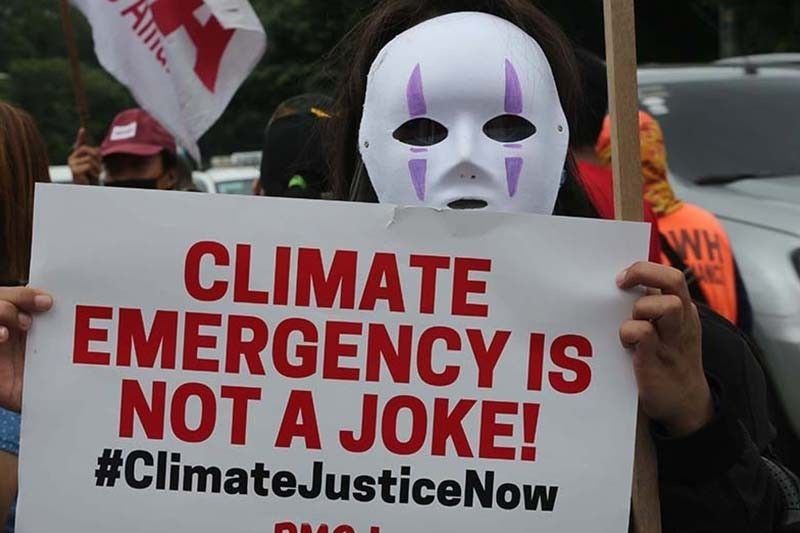Vaccine inequity, cost of quarantine may keep Global South activists out of COP26

MANILA, Philippines — November’s climate conference is the most important of its kind since the landmark Paris Agreement was signed in 2015, but the meeting is seen to exclude many delegates and campaigners from the Global South, putting the representation of those on the frontlines of the climate crisis at risk.
Vaccine inequity, prohibitive quarantine requirements, and health risks make it difficult to achieve the United Kingdom’s vision for a "normal and inclusive" COP26 climate summit due to take place from October 31 to November 12 in Glasgow in Scotland, climate activists said.
In a statement earlier this month, Climate Action Network, a global alliance of over 1,500 organizations, pushed to postpone COP26, stressing that the COVID-19 pandemic is compounding the "inherent power imbalance" between wealthy nations and poorer countries at the climate talks.
"Our concern is that those countries most deeply affected by the climate crisis and those countries suffering from the artificial shortage of vaccines will be left out of the talks and will be conspicuous by their absence at COP26," CAN executive director Tasneem Essop said.
Yeb Saño, executive director of Greenpeace Southeast Asia, will not participate in the negotiations due to the uneven vaccine rollout.
“There's so much vaccine inequity around the world and unless that’s resolved, any country that is in the 'red list' would be at a disadvantage because we’re not gonna be able to send the proper size delegation,” Saño told Philstar.com.
The so-called "red list"—countries with high levels of infections—includes many lower-income nations like the Philippines.
The former climate negotiator for the Philippines said there should be at least 20 people in a delegation.
Non-governmental organizations, which have been participating in the climate negotiations as observers, "enhance the substance" of the talks, Saño said. But the current circumstances are also threatening the participation of climate groups from developing countries.
"If we do not go there and bring our voices there for the sake of our national interest, meaning ambitious action to avert climate crisis, then we will continue to experience these adverse impacts," he said.
"That’s why it’s important for vulnerable countries and developing countries to be sending their delegation there to send the strong message the climate change should be taken seriously by world leaders."
The key goals of COP26 are to keep a temperature rise limit of 1.5 degrees Celsius within reach and mobilize climate finance.
Loss to the process
Vaccination is not mandatory, although the UK government is strongly encouraging that attendees get jabbed.
Whether vaccinated or not, participants from "red list" countries would be required to quarantine in hotels before attending COP26. The quarantine for fully-vaccinated people will be five days while it is 10 days for those who are not fully inoculated against COVID-19.
The current cost of staying in a quarantine hotel in the UK is £2,285 (around P157,000) per person for a 10-day stay, an amount that many representatives from developing countries cannot afford.
The UK government, however, said that it will fund the quarantine for all registered attendees who would otherwise find it difficult to attend COP26.
Some groups are asking for a virtual conference but the digital divide remains a barrier. And for a potentially planet-saving meeting, physical presence matters, Saño stressed.
"A big part of lobbying happens in the corridors and if we’re not able to travel there and participate meaningfully, it’s really a big loss to the process," Saño said.
Youth participation
Many things remain uncertain for the younger population who want to participate in COP26, said Jon Bonifacio, an activist with the Youth Advocates for Climate Action Philippines and Fridays for Future MAPA, which represents the people and areas most impacted by climate change.
COVID-19 vaccinations have started for delegates who applied for jabs through the COP26 registration process. But for many countries in the Global South, immunizing minors against COVID-19 is not a high priority.
"Many of my fellow activists have had a difficult time securing vaccines, to the point that some just gave up on any chance of being able to attend COP," Bonifacio said.
"It’s critical that the youth are represented at COP because both our present and future, by action or inaction, is decided in conferences like these," he added.
Fight outside of Glasgow
Not all battles against climate change will be fought at the Scottish Event Campus. Some will be on the streets; others will be done virtually.
In the Philippines, there will be mass actions as this year’s climate negotiations coincide with the first anniversary of the landfall of Typhoon Ulysses (Vamco) and eight years since Super Typhoon Yolanda (Haiyan).
"What’s important is that we don’t lose sight of the urgency of the climate crisis, fight to keep the conversation going, and work towards the necessary overhaul of our current society to prevent planetary collapse," Bonifacio said.
"The science and our concrete experiences make it clear that we have no time to lose."
- Latest
- Trending





























